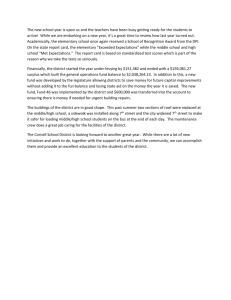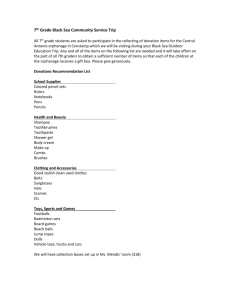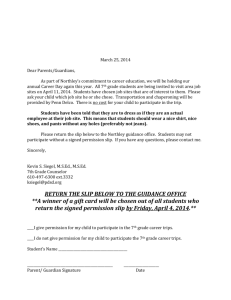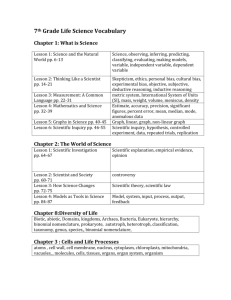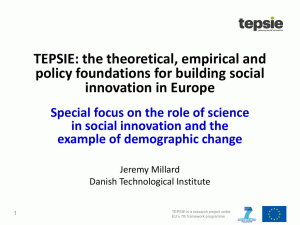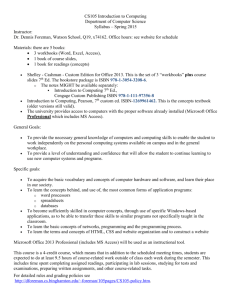Track I - University of St Andrews
advertisement
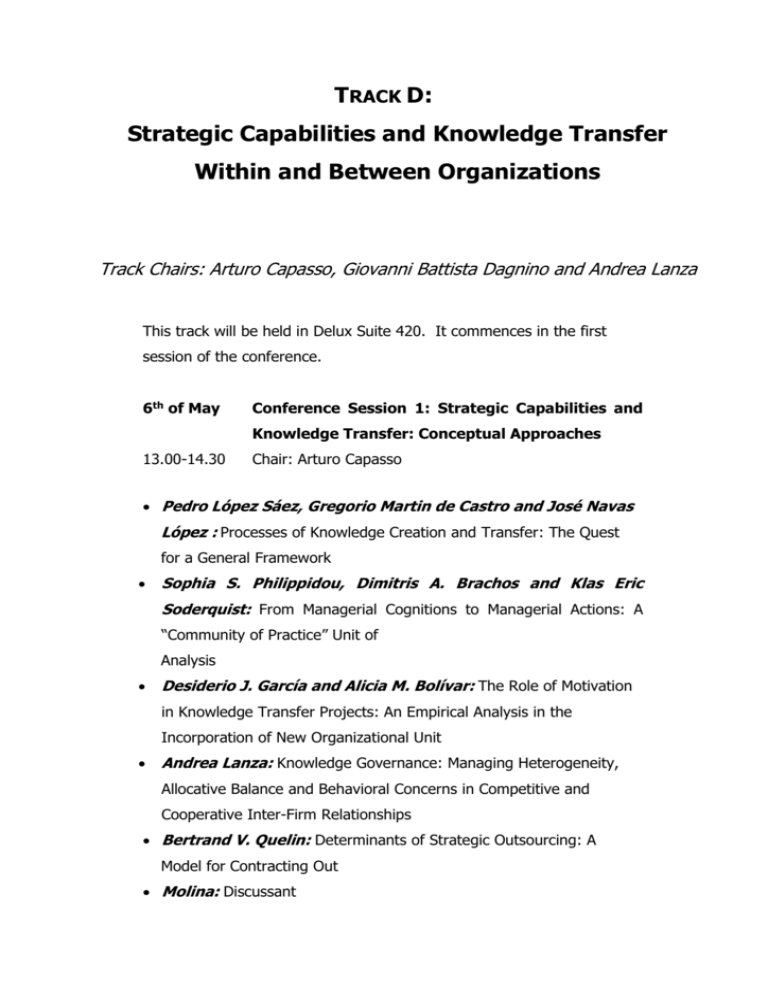
TRACK D: Strategic Capabilities and Knowledge Transfer Within and Between Organizations Track Chairs: Arturo Capasso, Giovanni Battista Dagnino and Andrea Lanza This track will be held in Delux Suite 420. It commences in the first session of the conference. 6th of May Conference Session 1: Strategic Capabilities and Knowledge Transfer: Conceptual Approaches 13.00-14.30 Chair: Arturo Capasso Pedro López Sáez, Gregorio Martin de Castro and José Navas López : Processes of Knowledge Creation and Transfer: The Quest for a General Framework Sophia S. Philippidou, Dimitris A. Brachos and Klas Eric Soderquist: From Managerial Cognitions to Managerial Actions: A “Community of Practice” Unit of Analysis Desiderio J. García and Alicia M. Bolívar: The Role of Motivation in Knowledge Transfer Projects: An Empirical Analysis in the Incorporation of New Organizational Unit Andrea Lanza: Knowledge Governance: Managing Heterogeneity, Allocative Balance and Behavioral Concerns in Competitive and Cooperative Inter-Firm Relationships Bertrand V. Quelin: Determinants of Strategic Outsourcing: A Model for Contracting Out Molina: Discussant 6th of May Conference Session: 2: Strategic Capabilities and Knowledge Transfer: Process Perspectives 15.00-16.30 Chair: Joan Enric Ricart Juan Carlos Bou Llusar, R. Lapiedra Alcamí and Mercedes Segarra Ciprés: Knowledge as Strategic Asset and its Implications in Knowledge Transfer Process Rebecca Marchan Piecari and Kristina Makela: Underlying Patterns of International Knowledge Sharing: Who Talks to Whom? Barbara Larraneta- Gomez-Caminero and José Luis Galan Gonzalez: Absorptive Capacity as a Type of Dynamic Capability Peter Galvin and Kelvin Willoughby: Interorganisational Communication, Knowledge Intensity, and the Sources of Innovation in the Biotechnology and Medical Devices Industries Stephan Kaiser: The Utilization and Integration of Professional Services Implications for Managing Organizational Knowledge Discussant: Gianmario Verona, Bocconi Univ. of Milan 6th of May Conference Session 3: Strategic Capabilities and Knowledge Transfer in Acquisitions and Alliances 17.00–18.30 Chair: Andrea Lanza David Knoke: Strategic Alliances: Formation, Developmental Dynamics, and Performance Outcomes Ulrich Wassmer: The creation of Organization Capabilities to Manage Alliance Portofolios: A Literature Review Wim Vanhaverbeke, Bonnie Beerkens and Geert Duysters: Explorative and Exploitative Learning Strategies in Technology-based Alliance Networks Arturo Capasso and Olimpia Meglio: Integration Capability and Knowledge Transfer in Post-Merger Integration: Some Evidences from the Frequent Acquirors Histories Maria Iborra and Angels Dasi: Acquisitions as Centers of Excellence. Can it Make a Difference? Denise Sumpf: Discussant 7th of May Conference Session 4: Strategic Capabilities and Knowledge Transfer in Networks 8.30-10.00 Chair: Pierre Dussauge Anupama Mohan: Strategic Capabilities for Transnational Management of Practices within TNCs Jay Barney, Valentina Della Corte and Mauro Sciarelli: SMEs Networks & DMS Gianmario Verona, Emanuela Prandelli and Mohanbir Sawhney: Innovation and Virtual Environments: Towards Virtual Knowledge Brokers Lucio Fuentelsaz, Juan Pablo Maicas and Yolanda Polo: Measuring the Impact of Switching Costs and Network Effects on the European Mobile Telecommunications Sector Giovanni Battista Dagnino: Strategic Capabilities and Interorganizational Best Practice Transfer: An Evolutionary Synthesis Barbara Larraneta Gomez-Caminero: Discussant 7th of May Conference Session 5: Strategic Capabilities and Knowledge Transfer: The Role of University and Other Institutions 10.30-12.00 Chair: Giovanni Battista Dagnino Jorge F.S. Gomes and Pia Hurmelinna: Managing collaboration of Universities and Companies: The Rules of the Game and the Game of the Rules Emilio Belini: A Knowing Approach to University-Industry Interorganizational Processes: An Empirical Research on ICT Distributed Companies María Otegui: Measuring the Effects of U-I linkages on firms Michael D. Rosko and Jose Proenca: The Impact of Inter-Organizational Collaboration on Hospital Cost: The Role of Environmental and Organizational Moderators Kimmo Riusala and Vesa Suutari: Impediments to the International Knowledge Transfers through Expatriates: A Qualitative Study Among Expatriates in Poland Salvo Torrisi: Discussant TRACK E: Gender and Management Track Chairs: Adelina Broadbridge and Jeff Hearn This track will be held in Ballroom 2. It commences in the second session of the conference. 6th of May Conference Session 2: Theories and Visions 15.00-16.30 Jim Barry, Elisabeth Berg and John Chandler: Academic ShapeShifting: Gendered Managerial Identities in Sweden and England Judi Marshall: Watching Corporate Social Responsibility Take Shape: Asking Gender Questions Ruth Simpson and Patricia Lewis: Using Visibility and Voice to Explore Gender and Organizations: a Review of the Literature Marieke van den Brink and Lineke Stobbe: Paradoxes in Gender Subtext Alison Linstead and Stephen Linstead: Gender Journeys: From Multiplicity to Nomadics in the Transformation and Emergence of Identities 6th of May Conference Session 3: From Margin to Centre 17.00-18.30 Adelina Broadbridge: The Balancing Act: The Personal Sacrifices Managers Make in their Career And Home Life Cristina Reis: Male Managers’ Domestic Arrangements: Differences Between England, Germany, Portugal and Finland Elaine Swan: On Weeping at Work: Crying, Emotionality and Gendering Anne Ross-Smith, Colleen Chesterman and Margaret Peters: “Watch Out, Here Comes Feeling!” Women Executives and Emotion Work Johanna Kujala and Tarja Pietiläinen: Female Managers’ Ethical Decision-making – A Multidimensional Approach 7th of May Conference Session 4: Women and Men Managers 8.30-10.00 Emilia Fernandes and Carlos Cabral-Cardoso: The Social Stereotypes of the Female Manager and Male Manager: Very Alike but Not Enough … Barbara Kożusznik: Regulation of Influences Ability and SelfMonitoring of Effective and Non-Effective Women and Men Managers Charlotte Holgersson: The Recruitment of Managing Directors as a Gendered Process Päivi Eriksson, Elina Henttonen and Susan Merilainen: Shared Agendas of the Social Network and Feminist Research 7th of May 10.30-12.00 Conference Session 5: Women Managers Tineke M. Willemson: Effects of Part-time Work and Motherhood on the Perception of Successful Female Managers: The Role of Cultural Norms Pia Höök: Constructions of Management in Women-only Organisations Ozura Omar and Marilyn J. Davidson: Women as Managers: A Comparative Study of the Malaysian Practices Morten Huse and Anne Grethe Solberg: How Women can make Contributions on Corporate Boards 7th of May Conference Session 6: Gendered Processes and Equal Opportunities 13.00-14.30 Jeff Hearn and Rebecca Piekkari: Gender Divisions, Gender Policies and Gender Practices in Top Management: Interviewing Chief HR Managers of Large Finnish Corporations Ulf Elg, Karin Jonnergård and Anna Stafsudd: Gender Barriers in Professional Organizations: A Study of Accounting Firms Norsiah Aminudin and Khairul Akmaliah Adham: Gender Work in R & D Organisations in Malaysia Manfred Auer and Heike Welte: ‘Equal Opportunity Actors’ – Identities, Social Positions and Strategies Carol Woodhams and Ben Lupton: Gender-based Equal Opportunity in Small to Medium Size Employers: Benchmarking Policy and Practice 7th of May Conference Session 7: Gender and Management: Future Research/Special Interest 15.00-16.30 TRACK F: THE FAMILY BUSINESS CONTINUITY: THEORY AND PRACTICE Track Chairs: Guido Corbetta, Amparo San Jose and Ugo Lassini This track will be held in Delux Suite 421. It commences in the sixth session of the conference. 7th of May Conference Session 6: “Family Business” 13.00-14.30 Edle I Gjøen, Lise Hålien and Morten Huse: Board decisionmaking in family businesses Salim Chahine: Corporate Governance and Firm Value for Small and Medium Sized IPOs Annika Hall: Managerial Life in the Family Business: In Search of Identity Salim Chahine, Edle I Gjøen and Ugo Lassini: Proposed discussants 7th of May Conference Session 7: “ Growth Strategy of SMS” 15.00-16.30 Anna Arbussà Reixach, Andrea Bikfalvi and Sanjay Goel: The accumulation of knowledge in small and medium-sized firms: The role of type of knowledge and absorptive capacity Leona Achtenhagen and Lucia Naldi: ‘Practicing growth’ – how companies build and use valuable resources for expansion Paola Giuri and Alessandra Luzzi: Growth strategies of technology based SMEs in Europe Pinar Yilmaz and S. and Birgi Martin: Collaboration and networking as a source of competitive advantage for small-medium sized enterprises Leona Achtenhagen, Anna Arbussà Reixach, Pinar Yilmaz and Paola Giuri: Proposed discussants Conclusions and Research Agenda TRACK H: MANAGEMENT AS THE DISCIPLINE OF THE SECOND MODERNITY Track Chairs: Ken Starkey and Armand Hatchuel This track will be held in the Boardroom. It commences in the fifth session of the conference. 7th of May Conference Session 5: Management as the Discipline of the Second Modernity 10.30-12.00 Hatchuel, A: “Epistemology of action: Management and the second modernity” Laufer, R:“Looking for the visible hand” Starkey, K:“The business school in the twilight of the first modernity” 7th of May Conference Session 6: Management as the Discipline of the Second Modernity 13.00-14.30 Michlewsky, K. & Silwa, L:“Developing a new breed of Aristotelian manager: Reconciling art and science through the philosophy and practice of design” Gianlucca, C. “Thinking and acting strategically” Roca, E. “Aristotle and Levinas: A ‘kaleidoscopic vision’ of business ethics” 7th of May Conference Session 7: Management as the Discipline of the Second Modernity 15.00-16.30 Pezet, E: “To conduct oneself in order to conduct the firm: an analysis of the use of coaching in management” McKinlay, A: “All play and no work? Experience, identity and reflexivity” La Rocca, S: “Strategy emergence: A journey through modernism, semeiotic, complexity and nonmodernism” Pesqueuex, Y: “Management science: Reshaping culture” 7th of May Conference Session 8: Management as the Discipline of the Second Modernity 17.00-18.30 Patriotta, G.: “Knowledge and modernity” Loveridge, R: “The role of management models in the modernisation of management in developing countries” Knights, D: “Towards a trans-disciplinary method for research: Reflectivity and ethics” TRACK I: STRATEGIC IMAGE MANAGEMENT: BRANDS, COMPANIES, AND CONSUMERS Track Chairs: Jonathan Schroeder, Miriam Salzer-Mörling and Majken Schultz This track will be held in Delux Suite 422. It commences in the fourth session of the conference. 7th of May Conference Session 4: Strategic Image Management: Brands, Companies and Consumers 8.30-10.00 Jonathan Schroeder Anders Bengtsson: Married Brands: Co-branding and the Management of Symbolic Meanings Klaus Jennewein, Alexander Gerybadze and Thomas Durand: The Role of Brand Equity in the Appropriation of the Returns of Technological Innovation: The Case of Bayer Aspirin Maria Backman: Exploring Experimentation: Concept Car Development 7th of May Conference Session 5: Strategic Image Management: Brands, Companies and Consumers 10.30-12.00 Henrik Uggla Ralf Reichwald, Kathrin Moeslein and Christoph Ihl: Mass Customization Shoppers Between Utilitarian and Hedonic Shopping Values Rosario Vázquez, Juan C. Real and Manuel Ortigueira: Consumer Relationship Proneness: Antecedents Veronika Tarnovskaya and Ulf Elg: The Dynamics of Market-Driving in a Globally Branded Retail Company Antonio Carmona-Lavado: The Antecedents of Customer Delight: An Empirical Study 7th of May Conference Session 6: Strategic Image Management: Brands, Companies and Consumers 13.00-14.30 Anders Bentsson Nopporn Srivoravilai and TC Melewar: Corporate Reputation and Resource Support Ulf Johansson and Sofia Ulver: Transferring International Retail Image Chen-I Huang: The Impact of the Franchise Relationship to the Organisational Development Henrik Uggla: What is Gore-Tex? 7th of May Conference Session 7: Strategic Image Management: Brands, Companies and Consumers 15.00-16.30 Janet Borgerson Hervé Mathe: Shaping the Contours of Services: Innovative Architecture and the Building of Corporate Symbols Martin Fougère and Per Skålén: Becoming and Being Normal – Not Excellent: Service Management, the Gap-model and Disciplinary Power 7th of May Conference Session 8: Strategic Image Management: Brands, Companies and Consumers 17.00-18.30 Jonathon Schroeder Paul Whysall: Stakeholder Engagement as a model of British Supermarkets’ News Management. Anne Rindell: Image Heritage in Corporate Image Management Ethel Brundin and Klas Gäre: How Smart is a Smart Community? The establishment of ICT in the municipal image and its implications for growth TRACK L: CROSS CULTURAL MANAGEMENT Track Chairs: S. Magala and Susan Schneider This track will be held in Delux Suite 421. It commences in the eighth session of the conference. 7th of May Conference Session 8: Does it work between continents, nations and sustainable environments? 17.00-18.30 Chair: Susan Schneider Terence Jackson: keynote address (double time slot) Cecilia Cassinger: Intercultural understanding beyond national borders Luciara Nardon and Richard Steers: Culture, Organization and Environmental Scanning 8th of May Conference Session 9: Knowledge management perspective 11.15-12.45 Chair: Nigel Holden David Weir: Knowledge Opportunities in organizational contexts: latent, tacit and subterranean knowledge John Saee: Dynamic organizational culture and economic performance of enterprises in the 21st century of global economy Slawomir Magala: Postcommunist cultural landscapes; the interplay of tacit knowledge and liberal ideology in evolutionary perspective Eva Kohonen: Narratives about the consequences of international assignments on identity 1 8th of May Conference Session 10: Global evolution of cultural softwares 13.00-14.30 Chair: Slawomir Magala and Barbara Krug Barbara Krug, Gabrielle Jacobs and Hans Hendrischke: How Chinese are Chinese entrepreneurs: Reinventing the notion of guanxi in the context of business relations Tony Fang: Cross-Cultural Management: a Yin Yang Metaphor Pawel Boski: The double trap of uncertainty un-avoidance: bureaucratic over-regulation or organizational improvisation 2
